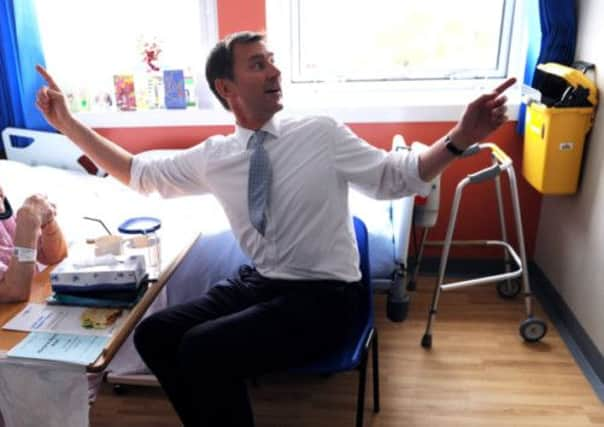Cash-crisis NHS chiefs write off telehealth devices


The move by managers in North Yorkshire comes after the bulk of family doctors in the county showed little interest in a programme hailed as a trailblazer for the NHS to monitor patients’ vital signs from home.
There had been calls from GPs for the scheme to be axed altogether but officials say it is being extended for another year, partly as a result of the decision to write off the value of the devices.
Advertisement
Hide AdAdvertisement
Hide AdThe move has drawn further criticism of health bosses in North Yorkshire where the NHS is mired in a long-term financial crisis and faces a deficit of up to £12m in 2012-13.
It comes as research, funded by the Department of Health, today reveals telehealth is unlikely to be cost effective for patients with long-term illnesses.
The findings are hugely embarrassing for the Government which has announced a major expansion of telehealth for 100,000 patients this year in seven areas including north, east and south Yorkshire and northern Lincolnshire, as part of measures to save cash by reducing demand for expensive hospital care.
A critical report by MPs today further warns the NHS faces an increasingly difficult task making savings as part of a £20bn efficiency drive and also raises doubts about those already achieved.
Advertisement
Hide AdAdvertisement
Hide AdUnder the telehealth project in North Yorkshire, fewer than 700 of the units have been used. Most are still in a warehouse and it remains unclear what will happen to them as they have now been superseded by more advanced technology.
GPs have pressed for the scheme to be scrapped despite the county being nominated by Health Secretary Jeremy Hunt to carry out a massive expansion in telehealth, while the NHS is also expected to lead deployment of telehealth as a key part of the high-profile super connected cities programme in York. Telehealth has also proved a big hit with patients, according to surveys. But predicted savings of as much as £6m from using all 2,000 devices have failed to materialise amid doubts about its impact on reducing hospital admissions.
Coun Jim Clark, chairman of North Yorkshire County Council’s health scrutiny committee, said: “It seems crazy to buy so many units when you didn’t have commitment from GPs – it shows they hadn’t done any proper assessment before they started.”
But he believed there was still a role for telehealth, particularly in remote rural areas, if costs could be reduced.
Advertisement
Hide AdAdvertisement
Hide AdA study published on bmj.com today of a major national trial of telehealth found the gains for people using the technology, in addition to standard support and treatment, were similar to those receiving standard care, while total costs were higher.
It concluded: “Telehealth does not seem to be a cost-effective addition to standard support and treatment.”
A Department of Health spokesman insisted, however, the study overall showed the benefits to be gained, citing a reduction in mortality “by 45 per cent, A&E attendances by 15 per cent and emergency admissions by 20 per cent”.
He added: “This part of the study confirms that to introduce the technology in isolation, at high cost and in low numbers does not bring the cost reductions we believe are there to be made.
Advertisement
Hide AdAdvertisement
Hide Ad“That is why our approach, known as the 3millionlives initiative, is different. It is about bringing in telehealth at scale and will create improvements in services, create improvements in services, care and costs.”
In North Yorkshire, a review by health chiefs decided to write off the value of the units, put at £2.3m. It concluded the equipment had no value owing to the development of more advanced technology and the imminent launch of a new model by the provider Selby-based firm Tunstall.
In a statement, managers confirmed they had written off the asset value of the units and as a result no longer needed to charge depreciation costs on their value which made them cheaper to deploy.
A new pricing structure was being put in place next month which would increase the potential for improved NHS savings and as a result the five clinical commissioning groups (CCGs) in the county had agreed to continue with the service until April next year.
Advertisement
Hide AdAdvertisement
Hide AdBill Redlin, director of standards at NHS North Yorkshire and York, said: “The CCGs will be able to use telehealth to help manage patients with long-term conditions effectively in their own homes. This will in turn reduce the number of hospital admissions and ultimately help the CCGs make the financial savings they need next year.”
Future access to telehealth is now likely to vary for patients across North Yorkshire. In the Vale of York, the devices are set to be used only by patients at high risk of hospital admission, just over half of the 300 patients currently using them. The rest will have them withdrawn.